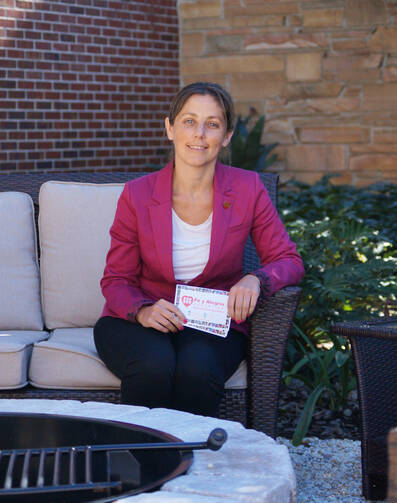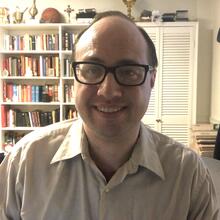Eleonora Tortorelli is an Argentinian Catholic laywoman who works in institutional development for Fe y Alegria Argentina, a Jesuit network of community development centers and educational programs serving 6,000 people in the homeland of Pope Francis. In addition to educating adults through non-formal job training and social service programs, the movement operates schools for children from preschool to high school level.
Founded by the Society of Jesus in 1955, the International Federation Fe y Alegria reaches over 1.5 million people in 23 countries overall, primarily in Latin America. Ms. Tortorelli holds an undergraduate degree in management from the Catholic University of Argentina and a graduate certificate in NGO development.
On Jan. 4, I interviewed Ms. Tortorelli in Tampa, where she was visiting Jesuit High School to promote Fe y Alegria Argentina. The following transcript of our conversation has been edited for style and length.
Fe y Alegria is a growing movement in Latin America, but many North Americans are unfamiliar with it. How do you describe it to people?
We work to contribute to the transformation of individuals and society by promoting the values of justice, participation, fraternity, respect for diversity and solidarity through education.
What is the goal of Fe y Alegria?
It’s providing quality education for the most impoverished and excluded sectors of society. We educate for change. We educate for transformation, not for approval, in the places where we’re needed most.
What can you tell us about the people you serve?
They are underprivileged people living in poor cities in the provinces of Buenos Aires, Chaco, Corrientes, Jujuy and Salta. They range from four-year-olds to middle-aged adults. They want to get an education and we help give them access to a better life. We give people opportunities and a chance to plan their future. You need to see hopeful things to not fall into despair, unemployment and drugs. We’re trying to promote a culture of work and peace because there’s a lot of violence in our culture. It’s very important for our kids to make a living after school.
The network is 20 years old in Argentina this year. How has Fe y Alegria grown there?
We started in 1996, before the 2001 economic crisis, starting schools in parishes, people’s homes or under a tree. These are places that didn’t have pavement, electricity, sewage or running water. The children didn’t have schools. The first years were focused on offering quality lessons, building schools, and offering teacher training and leadership for more formal education. Now we’re more focused on job training and peace programs, the most fundamental needs in our context. We want to help the kids find employment after they leave our schools. The peace programs address all kinds of violence including drug abuse, domestic abuse and bullying. We want the kids to put their energies into positive activities like arts and sports.
In English, the name of your network is “Faith and Joy.” What role does faith play at these schools?
Father Jose Maria Velaz, S.J., a Jesuit priest, founded “Fe y Alegria” in 1955 in Venezuela after visiting poor neighborhoods in Caracas. He had been taking a number of students from Andres Bello University to teach religion there. The people there said they also needed education, so a married couple lent their home as the first “Fe y Alegria” school to offer lessons. It spread all over Latin America from there.
The faith of "Fe y Alegria" is a commitment that the communities, the church, local authorities and private donors have made to better the situation in these places. It’s not only faith in God, but faith in people’s ability to improve their conditions. And the joy of knowing it can be done and of seeing it done.
You’ve worked 10 years for Fe y Alegria. Where do you see God present in this work?
I see him in every person, in each student, in each teacher and in anyone who commits to help and to be part of the movement.
You mentioned joy, which is also part of the network’s name. What does joy mean to you?
It’s the confidence and happiness of knowing that things will work out, that anyone can learn and that anyone can empower himself to change his life and community.
What have been some highlights for you in this work?
In these last 10 years, I have met a lot of people and that’s the most valuable thing. When I started, I thought I had many answers, and every time I visited some of the schools I realized I had a lot to learn. It’s a two-way relationship: the education takes place between two or more people who get transformed in the process. It’s not that one person has all the answers and the other person is listening and learning. I’ve learned that you can’t do it by yourself; you really need people to get involved to change things.
Another joy I’ve had is that I’ve seen a lot of improvements. I’ve seen kids grow up from very little to become adults who have a plan for their lives. They’re successful. I don’t know if success means the same for everyone, but if they have a plan and are agents of change, that’s success to me.
What have been some challenges for you?
Inequality. In my country, not everyone has the same quality of and access to education. Underprivileged kids needs the same quality of education as others. So the challenge is to provide quality education to everyone, not just to those who are in a better condition or place.
It’s a transformative education. I believe it’s a commitment we all have to make together. So another challenge is to get more people involved, spreading the word in Argentina and elsewhere.
How can people in the United States get involved in this work?
You can spread the word. In the United States, we have Friends of Fe y Alegria, an initiative of the International Federation Fe y Alegria and Magis Americas to raise awareness and get support. People can visit and share our website. They can also take action by starting a fundraising campaign to support our schools and special projects. For example, in Argentina, there was a tornado in one of our schools in Salta two years ago and now we’re rebuilding it. We can also use collaborators and volunteers. People can promote it in their parishes.
What are your hopes for the future?
I hope we can walk together with other organizations to help impoverished communities develop, promoting the right to a quality education.
What do you want people to take away from your work?
I would like people to know they can do something. They can get involved somehow and feel confident they will make a difference. After hearing about it, I hope people will say, “Oh, I would like to be part of that movement.” They can be part of the change.
If you could say one thing to Pope Francis about Fe y Alegria today, what would it be?
If I had the chance, I would invite him to visit us and talk to our participants.
Any final thoughts?
It’s very important to us that people become aware of their potential and contribute to the change that we want.
Sean Salai, S.J., is a contributing writer at America.








Thanks for reading!